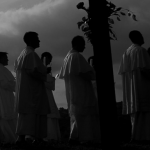A friend recently gave me the autobiography of a Benedictine nun at the Abbey of Regina Laudis in Connecticut, entitled The Ear of the Heart. In the first part, Dolores Hart, also known as the girl who first kissed Elvis, tells how she left a promising career in Hollywood, and broke off her engagement to a great guy, in order to enter the convent. The decision looked dramatic, but from Dolores’ perspective, it was a simple act of attention to the Voice that she could no longer ignore. Over the course of several years, through various inward and outward signals woven into the narrative of her life, Dolores heard Christ calling her to find Him in Regina Laudis, and she listened to His word.
In 1963, at the age of 24, Dolores knocked at the Great Gate of the monastery according to the traditional entrance ceremony, and Reverend Mother Benedict asked her: “What do you seek?” Dolores responded: “I seek the face of God through the Lord Jesus Christ in your community, Reverend Mother.” Dolores writes that when she walked in, she knew that she was walking to God – to find communion with Him. And yet, she continues, “I had no inkling what the matter and substance of that experience would be – what it takes to become a cloistered nun. I hadn’t asked commonplace questions about the day-to-day routine.”
What she found was a strange and difficult way of life, and not only that. The feeling of God’s Presence, which had always sustained Dolores amidst an unstable family and professional life, left upon her entrance to the monastery. She cried herself to sleep every night for three years. But she continued to believe in God’s word to her. “I was stubborn. I believed that I was called to take on this place and to follow Christ in His Passion. I couldn’t leave because deep down I trusted that God had to be there and that was what mattered. I swore that I would wait as long as I had to.”
The same theme of how hearing precedes sight is taken up by Benedict and Francis in the recent encyclical Lumen Fidei. Faith begins by hearing God’s word; sight comes later; this is the sense in which faith is a leap in the dark. “Faith by its very nature demands renouncing the immediate possession which sight would appear to offer; it is an invitation to turn to the source of the light, while respecting the mystery of a countenance which will reveal itself personally in its own good time” (13). But this turn in the darkness is not irrational or blind. It is a confident act of entrusting oneself to a word which, “when spoken by the God who is fidelity, becomes absolutely certain and unshakable, guaranteeing the continuity of our journey through history” (9). Lumen Fidei points out Mary, Abraham, and St. Augustine as witnesses of how faith is first an act of hearing God’s word, and taking steps as He gives direction, before He unveils His Face, and grants understanding. Faith does shine a light, and vision is essential, but first the ear of the heart must listen to the Voice that speaks out of the silence.
Engaging an audience according to this dynamic is Terence Malick’s genius. Although his most recent film To the Wonder, like the rest of his work, seems to occur mainly at the visual level, a deep silence opens up in contrast to the overwhelming abundance of beautiful images. The few words spoken lodge themselves deep within the heart; they are a point of reference, a rock amidst the film’s dreamlike beauty, and they reverberated in me long after the final scene. Just as the words of God’s laws about marriage guide the female protagonist through a misty labyrinth of feelings and thoughts, the film’s words speak out of its silence to anchor the audience in a truth that is difficult to see. Because she has been sacramentally married already, and does not have an annulment, Marina cannot marry Neil in the Catholic Church, and she cannot receive the sacraments while she is with him. But she loves him and he has committed to her, and this law of the Church seems exceptionally cold and irrational. Like Dolores Hart, however, Marina chooses to listen to Christ’s Voice, and carry out a painful separation from the man she loves.
It is hard to believe her in the final scene, when she is alone, but promises that her fidelity to God’s Word has brought happiness. “Love that loves us, thank You.” It is hard to believe her, but her word rings strangely true, and lingers, and grows to embrace the whole film. The second time that I saw To the Wonder, the words of that final scene somehow filled all of the images that come before with light. Despite the repetitious beauty of individual shots, this light had been absent before. Marina’s trust in God’s Voice at the film’s end first leads her and the audience into a cold but truthful darkness, and then to the wonder that is God’s luminous love.
The second part of Dolores Hart’s autobiography makes the same promise. On the twenty-fifth anniversary of her vows, Dolores writes: “Perhaps the deepest gift of the day is finally to realize that I really want to be a contemplative. I could not bear the surface existence outside. I want to live and pray and plumb the depth within the heart of this community. I want to keep the truth of the Jubilee in my consciousness: that all things are held and destined, and so am I.”
We will one day understand how the meaning of every moment is God’s love, and that every word He speaks is for our happiness. But vision comes only in the living, after we stake our lives on a word. We have to take Marina and Dolores’ word for it that attuning “the ear of the heart” to God’s word, and heeding it, leads to real life, and real communion. We have to trust, and that means taking steps towards the Voice in the darkness, being patient for a glimpse of the Face.













